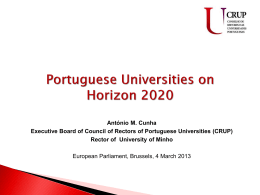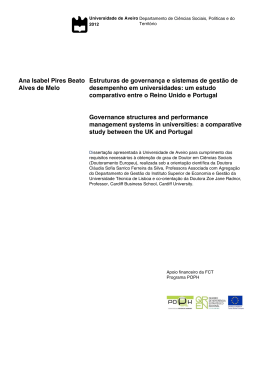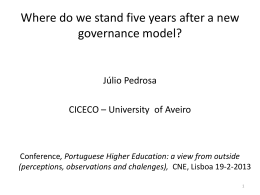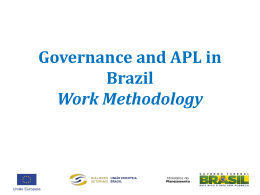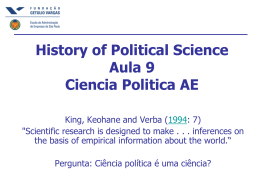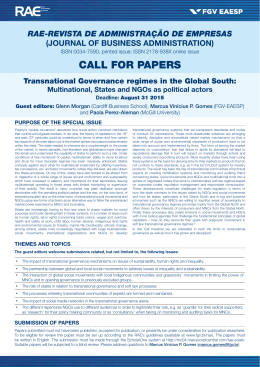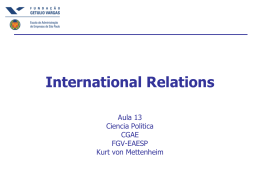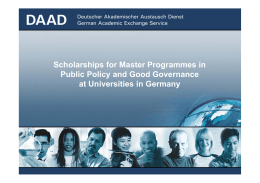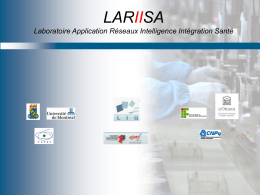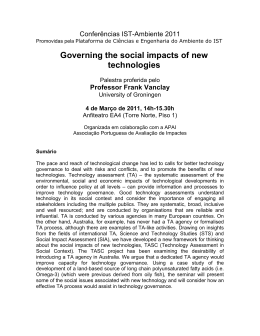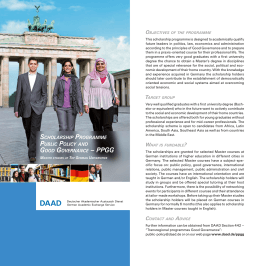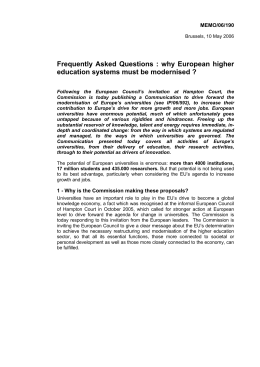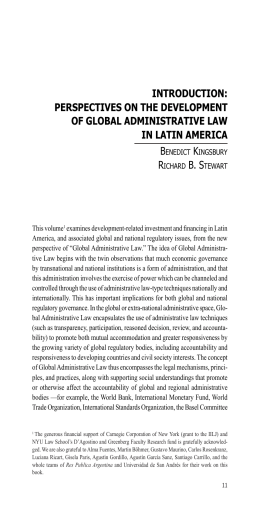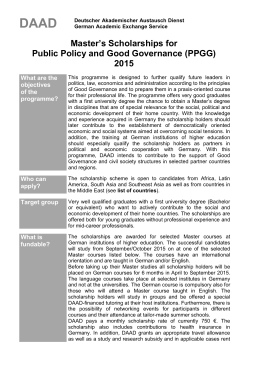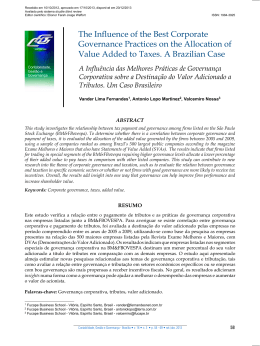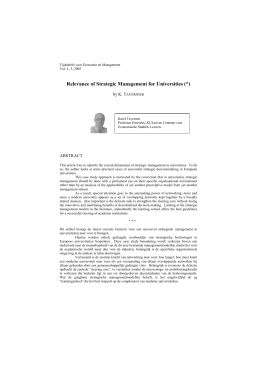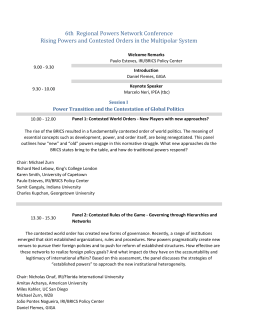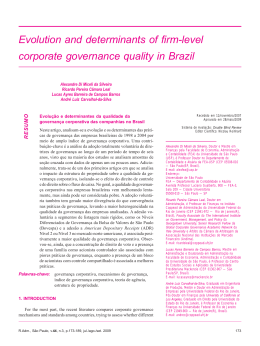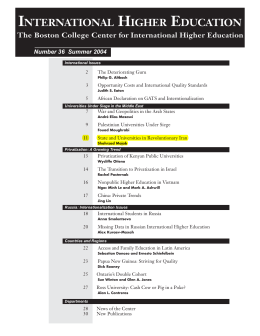‘GOVERNANCE, SCIENCE AND INNOVATION IN DEVELOPMENT POLICIES’ INTERNATIONAL SEMINAR SPEAKERS PART I – LEADERSHIP FOR GOVERNANCE: MUCH ADO ABOUT NOTHING? Gerry Stoker is Professor of Politics and Governance and Director of the Centre for Citizenship, Globalization and Governance at the University of Southampton, UK. Professor Stoker’s main research interests are in governance, democratic politics, local and regional governance, urban politics, public participation and public service reform. His current research deals with issues of governance in complex settings, political disenchantment in western democracies, citizen empowerment and strategies for encouraging civic behaviour among citizens. He was the founding chair of the New Local Government Network that was the think-tank of the year in 2004 and his book ‘Why Politics Matters’ won the 2006 political book of the year award from the Political Studies Association of the UK. Professor Stoker has provided advice to various parts of UK government and is also an expert advisor to the Council of Europe on local government and participation issues. In 2004, he won the Political Studies Association Award for 'making a difference' in recognition of the impact of his work on governance issues. Colin Copus is Professor of Local Politics and Director of the Local Governance Research Unit in the Department of Politics and Public Policy, De Montfort University. He is an expert in local governance, local party politics, local political leadership, local policy development, the changing role of the councillor and small party and independent politics. Colin is the author of two major books: ‘Leading the Localities: Executive Mayors in English Local Governance’ (2006) and ‘Party Politics and Local Government’ (2004). He is also co-editor of Local Government Studies. Colin has worked closely with policy-makers and practitioners in central and local government and has expertise and experience in developing and providing seminars/workshops for councillors and local government officers on a range of contemporary local government issues. He has served as a councillor on a London Borough council, a county and a district council and three parish councils. Giovanni Allegretti is an architect, planner and senior researcher at the Centre for Social Studies of the University of Coimbra, Portugal, where he co-directs the PhD ‘Democracy in the XXI century’ and coordinates the ‘PEOPLEs' Observatory: Participation, Innovation and Local Powers’. Since 2001, he has been assistant professor in Town Management at the University of Florence. Expert of the European Commission for the URBACT Programme, he deals with Participatory Budgets and Interactive Planning since 1998. On this subject he wrote several books, and was invited as a consultant to hold professional courses for Local Authorities, Universities and NGOs in several countries, as well as for International Institutions. Since 2008 he coordinated the scientific training of ‘Participatory Budgeting in Portugal’, an EQUAL-funded project that trained more than 600 Portuguese local authorities and technicians. Dr. Allegretti is also a member of several international organisations whose aim is networking ‘best practices’ on urban participatory management. Luís de Sousa got his PhD in Social and Political Sciences at the European University Institute, Florence (Italy), with a thesis entitled ‘Corruption: Assessing Ethical Standards in Political Life through Control Policies’. Since 2002, he has been Research Associate at the CIES-ISCTE, Lisbon, and at the Australian National University in Camberra, Visiting Professor at the University of Sofia, and a Gulbenkian Fellow at the European University Institute, Florence. He was also a Research Fellow at the Instituto de Ciências Sociais (University of Lisbon). Currently he is Assistant Professor at the Department of Social, Political and Territorial Sciences (University of Aveiro). He is Director of ANCORAGE-NET, the leading research network on anticorruption agencies and acts as a consultant to various international governmental and non-governmental organizations on corruption control and political financing issues. His current research interests focus on corruption and corruption control studies, the politics of ethics reforms, regional integration, cross-border relations, international organizations and comparative politics. 1 ‘GOVERNANCE, SCIENCE AND INNOVATION IN DEVELOPMENT POLICIES’ INTERNATIONAL SEMINAR SPEAKERS PART II – SCIENCE, DEVELOPMENT POLICY AND THE STUBBORN REALITY! Bjørn Asheim is Professor of Economic Geography and Innovation Theory at University of Stavanger (Norway) and program director at the Norwegian Research School in Innovation. He is also professor at CIRCLE (Centre for Innovation, Research and Competence in the Learning Economy - Lund University), one of the leading innovation studies centres in Europe, which he co-founded and directed. His research interests include: regional clusters, regional innovation systems and learning regions; SMEs and innovation policy; globalization, and the geography of the creative class. He participated in DIME (Dynamics of Institutions and Markets in Europe 6thFP) and coordinated EU/TSER project ‘SME Policy and the Regional Dimension of Innovation’ and ESF projects ‘Technology, talent and tolerance’ and ‘Constructing Regional Advantage’. He was an adviser of two major Canadian research projects, ‘Clusters and regional development’ and ‘The Social Dynamics of Economic Performance: Innovation and Creativity in City-Regions’, and was an international expert for UNCTAD, OECD and EU. He was editor of Economic Geography and Regional Studies. Louise Kempton is a Senior Research Associate at the Centre for Urban and Regional Development Studies (CURDS) at Newcastle University. Prior to this she has worked on economic strategy development at the Regional Development Agency for the North East of England, One North East. Her current work is focused on the relationship between universities and regions and particularly the role of universities as ‘anchor’ institutions in regional innovation and growth and the nature of the ‘civic’ university. She is currently working on the Civic University Study Programme (CUSP), a programme of research and engagement with policy and practice around the development of a new model for higher education institutions, led by Professor John Goddard. Louise is the co-author (with Professor John Goddard) of the EU Guide 'Connecting Universities to Regional Growth' which is designed to enable public authorities to promote the active engagement of universities and other higher education institutions in regional innovation strategies for smart specialisation. John Edwards is an expert on regional development policies at the Smart Specialisation Platform of the Institute for Prospective Technological Studies in Seville, part of the European Commission's Joint Research Centre. He has an interest in the role of universities in Smart Specialisation and is also following UK and Portugal strategies within the Platform. He is an economic geographer by training and completed his PhD at Newcastle University's Centre for Urban and Regional Development Studies, on ‘A Capabilities Approach to Local and Regional Development in Europe. Evidence from Alentejo, Portugal’. John has a vast professional background related with EU policies for economic development, including working experience at the Leader Observatory, the European Central Bank and as a research consultant. Paulo Pinho is a Full Professor of Planning at the Faculty of Engineering, University of Oporto, and founder and Director of the Research Centre for Territory, Transports and Environment (CITTA). He is also the Director of the MSc Programme in Spatial Planning and Urban Design (University of Oporto) and Director of the PhD Programme in Spatial Planning (Universities of Oporto and Coimbra). He graduated in Civil Engineering, got a postgraduate diploma in Urban and Regional Planning, and a PhD in Environmental Planning from Strathclyde University (Glasgow). His recent research focuses on urban metabolism and low carbon cities, urban morphology and metropolitan dynamics, shrinking cities and new forms of urban space production. He is the author and/or co-author of over 150 publications on environmental planning subjects. 2
Download

